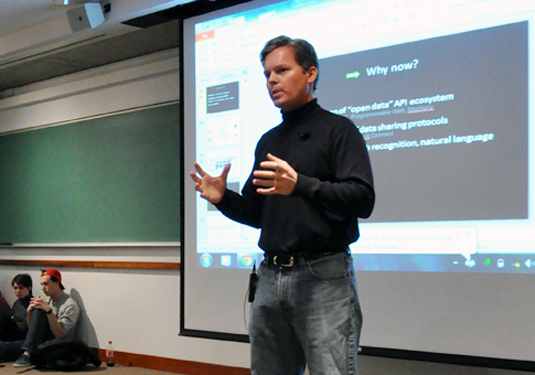Dag Kittlaus on Siri, Success, and the Technology of Tomorrow
Siri co-founder speaks to McCormick students in Dean’s Seminar Series

As the world’s first virtual personal assistant, Siri is revolutionizing the way we interact with the Internet — and driving directions and dinner reservations are just the beginning.
How did Siri make it to the top, and how can today’s up-and-coming engineers and entrepreneurs follow suit? Dag Kittlaus, Siri’s co-founder and former CEO, answered these questions and more in a talk, “Siri and Beyond,” held November 13 as part of the McCormick School of Engineering Dean’s Seminar Series.
Addressing a standing-room-only crowd of students, Kittlaus gave a 30-minute talk about Siri’s history, how it became part of Apple, and predictions for how new technology will shape our world, followed by a lengthy Q&A.
Siri was developed by Kittlaus and others at the Stanford Research Institute, where Kittlaus served as the institute’s first “entrepreneur-in-residence.” The company launched in 2009 with a 24-person team; three weeks later, Kittlaus’ phone rang. It was Steve Jobs “We had a storybook kind of story when it comes to start-ups.”
After an extended negotiation, Kittlaus sold Siri to Apple in 2010. He went on to join the company as its director of iPhone apps, where he runs the speech recognition and Siri teams within the company.
But it wasn’t all talent or luck that allowed Siri to succeed, Kittlaus said; it was timing. For Siri, that meant a laundry list of well-timed technological advancements, such as the maturation of speech recognition software and the standardization of data sharing protocols.
It was also awareness of the market that allowed them to succeed. Kittlaus quoted hockey great Wayne Gretsky: “’I don’t skate to where the puck is. I skate to where it’s going to be,’” Kittlaus told the crowd. “That’s a big part of the way we looked at (the company).”
In the second part of his talk, Kittlaus focused on major technological advances that promise to change the world as we know it, from self-driving cars, to artificial blood cells, to 3D printing of every consumer good imaginable.
“In 30 years, the really hot item is going to be home printers … but people won’t send you an email,” Kittlaus told a McCormick audience. “They’re going to send you a pizza,” and you’ll “print” it and eat it hot.
People will live to be 500 years, Kittlaus predicted; in fact, the first person to live over 200 is likely already alive. “It’s not a question of if it’s going to happen, it’s how long is it going to take,” he said.
But these amazing feats require more than scientists, he said. They require “the marriage of engineering and entrepreneurship.”
“(These advances are) going to happen quickly. … You have to keep thinking ahead,” he said. “Engineers are going to rule the world more and more from here on out.”